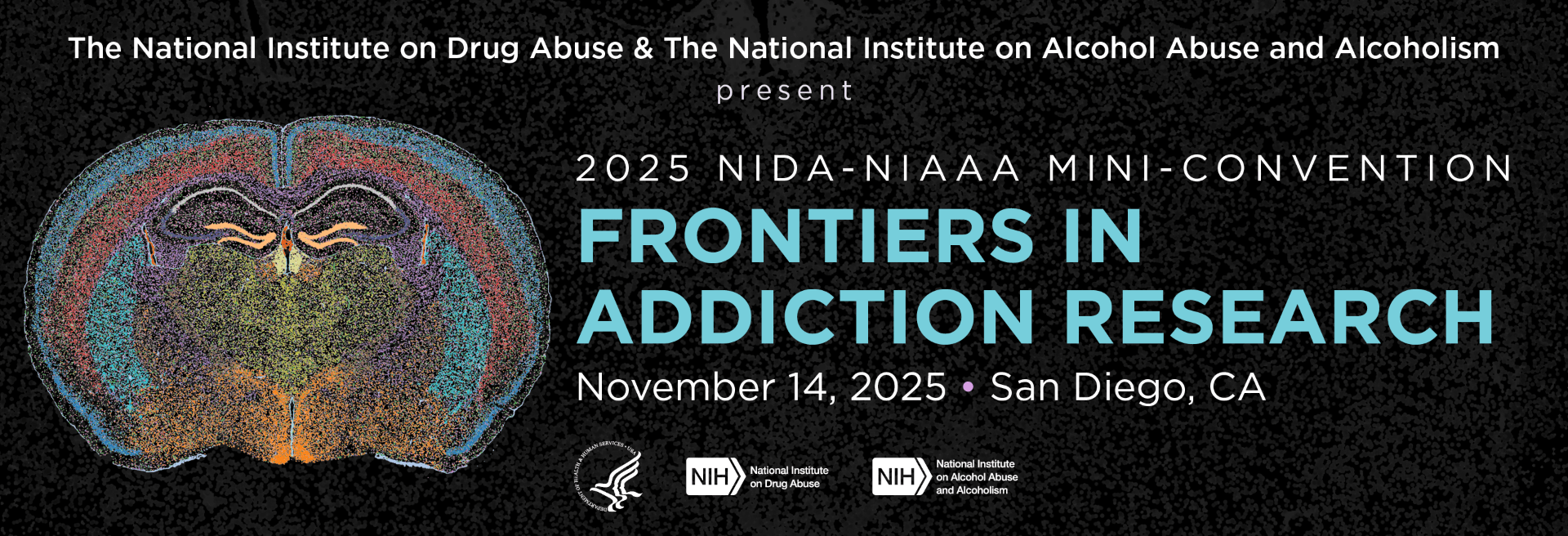
Agenda
2025 NIDA-NIAAA Mini-Convention: Frontiers in Addiction Research
NOVEMBER 14, 2025
ALL TIMES PACIFIC
Click here to download a copy of the agenda.
9:00 – 9:10 am |
Introduction to the Mini-Convention Erin Calipari, Ph.D., Vanderbilt University |
9:10 – 10:15 am |
Jacob P. Waletzky Memorial Award Lecture Chair: Erin Calipari, Ph.D. Speaker: Marco Venniro, Ph.D., University of Maryland, School of Medicine From Isolation to Connection: A Journey Through Addiction Neuroscience |
10:15 am – 11:45 am |
Scientific Session I. Human iPSC-Derived Organoids and Assembloids for Brain Development, Disorders, and Diseases Chair: Gabriel G. Haddad, M.D., University of California, San Diego Speakers: Gabriel G. Haddad, M.D., University of California, San Diego Effect Of Methadone on the Developmental Properties of Human Brain Organoids Joel Blanchard, Ph.D., Icahn School of Medicine at Mount Sinai Discovering Therapeutic Target of Genetic and Environmental Vulnerabilities for AD And PD In Brain Organoids Lorenz Studer, M.D., Memorial Sloan Kettering Cancer Center Capturing Features of Neuropsychiatric Disease in Human PSC-based Models |
11:45 am – 1:00 pm |
Lunch Break (on your own) |
1:00 pm – 2:30 pm |
Scientific Session II. Interrogation of Large Single-Cell Data Sets to Identify New Addiction Targets Chair: Brian R. Herb, Ph.D., University of Maryland Speakers: Lauren Wills, Ph.D., Icahn School of Medicine at Mount Sinai Three-Dimensional Spatial Analysis of the Nucleus Accumbens Brian R. Herb, Ph.D., University of Maryland Cross-Species Insights into Opioid and Stimulant Effects in the Nucleus Accumbens Veronica Alvarez, Ph.D., National Institute of Mental Health (NIMH) Intramural Research Program (IRP) (Tentative pending government shutdown) Emergence pf Resilience Genes Among Transcriptomic Analysis of Compulsive-Like Drinking in Mice Presentation will be given by Daniel da Silva, Ph.D., Icahn School of Medicine at Mount Sinai |
2:30 pm – 3:15 pm |
Joint NIDAA-NIAAA Early Career Investigator Showcase Chair: Marco Venniro, Ph.D. Speakers: Brenda Cabrera-Mendoza, M.D., Ph.D. Postdoctoral Associate, Yale University PRS-Guided Drug Repositioning for Alcohol Use Disorder and Comorbidities in Veterans Tanzila Mukhtar, Ph.D. Postdoctoral Fellow, University of California, San Francisco Decoding the Cellular and Molecular Consequences of Prenatal Cannabis Exposure in Human Cortex Yasmin Zakiniaeiz, Ph.D. Assistant Professor, Yale University Imaging Markers of Neurodegeneration in People with Alcohol Use Disorder Using Positron Emission Tomography Katherine Savell, Ph.D. (Tentative pending government shutdown) Research Fellow, National Institute on Drug Abuse, Intramural Research Program Transcriptomic Signatures of Cocaine Relapse Ensembles: Toward Drug Repurposing for Relapse Prevention |
3:15 pm – 3:30 pm |
Break |
3:30 pm – 4:45 pm |
Scientific Session III. Cutting-Edge Multiomic Approaches for Enhanced Drug Repurposing Strategies in Substance Use Disorders. Chair: Richard Weinshilboum, M.D., Mayo Clinic Speakers: Julie White, Ph.D., RTI International Integrating Multi-Omics and Drug Repurposing Tools to Identify Novel Candidate Therapies for AUD Richard Weinshilboum, M.D., Mayo Clinic Alcohol Use Disorder, Multiple Omics and FNDC4 Falk Lohoff, M.D., National Institute on Alcohol Abuse and Alcoholism (NIAAA) (Tentative pending government shutdown) Multi-Omics Approaches for Novel Target Discoveries in Alcohol Use Disorder |
4:45 pm |
Closing Remarks Richard Weinshilboum (tentative) |